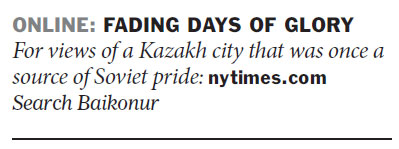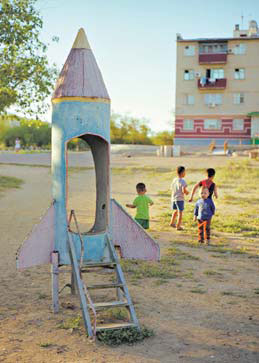Russian spaceport declining
Updated: 2013-06-30 07:37
By Andrew E. Kramer(The New York Times)
|
|||||||
|
Signs of the space age are all over Baikonur, including at a playground. James Hill for The New York Times |

BAIKONUR, Kazakhstan - In remote western Kazakhstan, Baikonur was once the pride of the Soviet Union, the home of the Baikonur Cosmodrome, the launching site of Sputnik, the dog Laika and the first man in space, Yuri Gagarin. But today, nomadic herders from the nearby steppe are moving into abandoned buildings.
That is just one of the signs of the city's long fade into post-Soviet social and economic problems, which are all the more remarkable given that much of the world, including the United States, still relies on Baikonur for manned space launchings. The only other site for such liftoffs is in Jiuquan, in the Gobi Desert in China.
"It's painful for me to think of my town," Anna Khodakovskaya, the editor of the local newspaper, said of its glum state. The first cellphones appeared here in 2004; the first M.R.I. machine in 2011. "We are not ahead of the planet in anything but space," she said.
Today 70 percent of Baikonur's residents are Kazakh citizens, but the town remains a Russian enclave rented for $515 million a year from the Kazakh government and administered under Russian jurisdiction. At the time of the Soviet breakup, the ratios were reversed: it was only about one-third Kazakh.
Now, the herders, day laborers and market traders stroll the streets, with only the occasional aging Russian engineer visible.
It is a dusty town, but nearly every building is decorated with a mosaic of a rocket, a spacewalking cosmonaut or stars and fanciful renderings of planets. In fountains, water bubbles from spouts shaped like rockets, and signed portraits of astronauts adorn the walls of cafes.
It is a left over problem from the breakup of the Soviet Union that has, strangely, become extraordinarily important for every manned space program except China's.
NASA in May extended the contract for astronaut launchings for a year, until mid-2017, for an additional $424 million. For now, every American astronaut blasts off from this town, the stand-in for Cape Canaveral during a gap in funding for manned missions in the United States. Because of this dependency, NASA requires all its astronauts in training to achieve proficiency in Russian before graduating to the astronaut corps.
The space agencies of the European Union, Japan and Canada also launch from here on Russian rockets, under an agreement with NASA to repurchase about half of the six seats NASA buys annually from the Russians.
From all this, Baikonur may sound like a prosperous hub of space activity. But every nation including Russia, which is building a replacement launchpad on its own territory in the Far East, called Vostochny, views this state of affairs as temporary. As a result, the city of Baikonur has been ignored, and it is falling apart.
"Russia will not be able to roll up the roads and take them away when it leaves," Ms. Khodakovskaya said.
Social problems typical of Central Asia today, like abuse of heroin smuggled from Afghanistan, labor migration and growing Islamic fundamentalism, are creeping into the city. A few years back, the police arrested men in Tura-Tam, a Kazakh village just outside Baikonur's guarded fence, for distributing leaflets for Hizb-ut-Tahrir, a fundamentalist Islamic group.
The town is a low boil of ethnic tension, too, as Russians hold nearly all the high-paying space jobs. In 2011, young Kazakh men ran in a mass down a central street yelling, "The head is a dog," a reference to the Russian mayor.
At the outdoor market, traders flash gold-toothed smiles and hawk Central Asian pottery glazed with crudely drawn rockets, or the smiling face of Yuri Gagarin in a helmet.
Before space missions, NASA astronauts and administrators stay at an upscale hotel on the edge of town, where the cheapest room is about $340 a night, rarely venturing into the town.
Even President Vladimir V. Putin, in a speech on Cosmonaut Day on April 12, referred to Baikonur as "physically aged."
Jene Ragan, a software engineer from Bethesda, Maryland, came as a tourist to watch a liftoff in May, swatting at flying ants while watching the rollout of a rocket. Ms. Ragan observed, "These people are putting up rockets, but the town itself is like a third-world country."
The New York Times
(China Daily 06/30/2013 page11)
